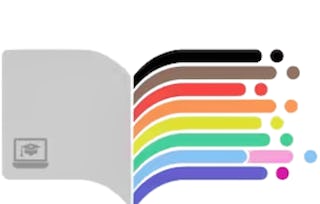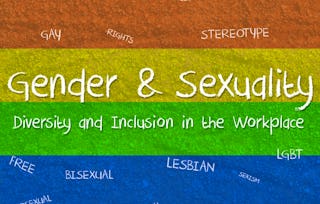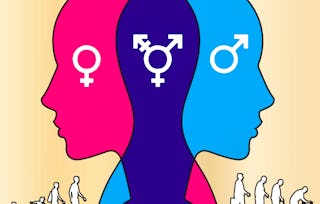In this course, you will explore the history of LGBTQ identities, experiences, and activism. We’ll study major events in global LGBTQ history, investigate local histories of queer and transgender people and communities, and consider how LGBTQ histories have helped shape broader conversations about civil rights, equality, and justice.

Queering Identities: LGBTQ+ Sexuality and Gender Identity

Queering Identities: LGBTQ+ Sexuality and Gender Identity


Instructors: Jacob McWilliams
31,676 already enrolled
Included with
728 reviews
Skills you'll gain
Details to know

Add to your LinkedIn profile
6 assignments
See how employees at top companies are mastering in-demand skills

There are 6 modules in this course
Learn and get to know your instructors that will guide you in this course.
What's included
3 videos2 readings
This module provides an overview of the terminology and definitions we will be using throughout the course and establishes a plan of action for learning from and with each other as we put the terminology into practice. We will discuss regional and local variations in terminology and language use, and learners will research and identify local applications of LGBTQ+ terminology. Learners will draw on their knowledge to discuss the current state of LGBTQ+ inclusion in their context.
What's included
6 videos4 readings2 assignments
In this module, we explore the concept of gender as a social construct and consider how all of us learn about and reinforce or resist gender norms. We’ll look at some strategies for creative resistance to socially constructed beliefs about gender and also consider the experiences of transgender people as they transition into a new gender identity.
What's included
6 videos4 readings1 assignment
This module extends the exploration of social constructs to consider how sex and sexual identities have been socially constructed. We critically examine the common presumption that sex is biological, or natural. We draw on the experiences of intersex and transgender communities to consider an alternative approach to understanding sex. Then we introduce the idea of sex as a social construct that is intimately tied to, but is distinct from, gender.
What's included
5 videos4 readings1 assignment
This module considers sexuality and sexual identities as social constructs, exploring how cultural norms about sexuality and sexual attraction have been developed and used to regulate human behavior. We introduce queer theory as a framework for analyzing the impact of norms about gender, sex, and sexuality on our lives and communities, and we invite participants to practice applying a queer framework to their own lives and experiences.
What's included
5 videos5 readings1 assignment
In this module, we explore some contemporary LGBTQ+ issues, drawing on queer theory to understand and interpret those issues. This module takes on: The bathroom issue: how to (re)design public restrooms and locker room for transgender inclusion; Racism and whiteness in LGBTQ+ communities; Queer(ing) religion: A history of conflict and reconciliation; Queer parenting: A case study of one queer family; and Queering sex education: An LGBTQ+ inclusive approach to sexuality curricula.
What's included
6 videos5 readings1 assignment
Instructors


Offered by
Explore more from Education
 Status: Preview
Status: PreviewUniversity of Colorado System
 Status: Preview
Status: PreviewUniversity of Pittsburgh
 Status: Free Trial
Status: Free TrialAmerican Psychological Association
 Status: Free
Status: FreeStanford University
Why people choose Coursera for their career

Felipe M.

Jennifer J.

Larry W.

Chaitanya A.
Learner reviews
- 5 stars
82.41%
- 4 stars
13.87%
- 3 stars
2.47%
- 2 stars
0.68%
- 1 star
0.54%
Showing 3 of 728
Reviewed on Jan 6, 2023
This was the first course I completed on Coursera. It really pushes to think outside the cis-hetro world we grow up in. And the material is also very non-overwhelming, and easy to understand.
Reviewed on Mar 14, 2022
This course taught me the new variations about LGBTQ and its diffenert arenas. It taught us how biological, sociological and psychological concept plays important role in determind the definitions.
Reviewed on Sep 7, 2020
The best course about the LGBTQ+ community and gender on a broader scale. A huge thank you for the effort. I'm proud to be part of the community!

Open new doors with Coursera Plus
Unlimited access to 10,000+ world-class courses, hands-on projects, and job-ready certificate programs - all included in your subscription
Advance your career with an online degree
Earn a degree from world-class universities - 100% online
Join over 3,400 global companies that choose Coursera for Business
Upskill your employees to excel in the digital economy
Frequently asked questions
To access the course materials, assignments and to earn a Certificate, you will need to purchase the Certificate experience when you enroll in a course. You can try a Free Trial instead, or apply for Financial Aid. The course may offer 'Full Course, No Certificate' instead. This option lets you see all course materials, submit required assessments, and get a final grade. This also means that you will not be able to purchase a Certificate experience.
When you purchase a Certificate you get access to all course materials, including graded assignments. Upon completing the course, your electronic Certificate will be added to your Accomplishments page - from there, you can print your Certificate or add it to your LinkedIn profile.
Yes. In select learning programs, you can apply for financial aid or a scholarship if you can’t afford the enrollment fee. If fin aid or scholarship is available for your learning program selection, you’ll find a link to apply on the description page.
More questions
Financial aid available,

